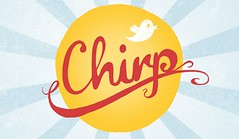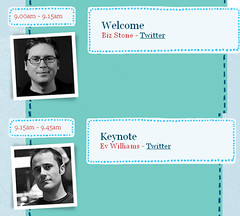 Twitter is suddenly more all over the news than
Twitter is suddenly more all over the news than
usual. So what’s all buzz?
Turns out, lot’s of things.
First, let’s start with the big event: today was the first day of
Twitter’s inaugural developers’ conference called Chirp.
This is a gathering of just under 100 geeks at San Francisco’s Palace
of Fine Arts who build applications that rely on Twitter feeds
(or APIs) to provide a Twitter-related service to end-users (that would
be you and me.) Company co-Founder and CEO, Evan Williams said that
developers using the Twitter API make about three billion calls a day
into the service.
These applications make it easier for individuals and businesses to,
for instance, send tweets from their desktops or mobile devices across
multiple accounts (Seesmic or TweetDeck),
or to send pictures via Twitter (TwitPic),
or to analyze how well you or your brand is doing in the Twitterverse.
Second, a bunch of numbers were announced today. Company co-Founder
Biz Stone said Twitter now has  nearly 106 million registered users and
nearly 106 million registered users and
adds about 300,000 new users per day worldwide. So, that’s a lot.
What’s really notable is that about 75 percent of Twitter’s traffic is
from outside Twitter.com – that is, all those applications I mentioned
above are driving the lion’s share of tweets that are broadcast around
the world every day. The other big number is that Twitter handles about
19 billion search queries per month either on its own site or via the
API – which makes them second only to Google in total search queries per
month.
That takes us to the third thing: revenue. Since it broadcast its
first tweet in March, 2006 everyone has wondered one thing: how will
Twitter make money? Four years later, they’ve got an answer. Promoted
Tweets.
According to Twitter COO, Dick Costolo, Promoted Tweets will be a
system whereby businesses can bid to promote their own tweets into
top-of-stream conversations around particular topics. For instance, say
you’re Paramount Pictures and you’re promoting a new
movie with opening night parties in cities around the U.S. So you blast
out tweets saying “Find an opening night party at a theater near you.â€
Today, you send that tweet out and it quickly becomes buried under all
the tweets that follow it. With Promoted Tweets, each time someone
includes your keyword – say, the movie’s title, or the name of its
principal star – your tweet will quickly follow-on that tweet to the
same group of followers. If Paramount’s tweet gets re-tweeted,
clicked-on or favorited, such actions will somehow accrue to the benefit
of the advertiser (it isn’t exactly clear how, but I’m guessing its
akin to Google’s performance-based quality score for
ads in its AdWords system).
“All that exist in our monetization platform are tweets,†Costolo
said. “Everything is a tweet. A Promoted Tweet is a tweet. You can do
anything to a Promoted Tweet that you can do to a regular tweet.â€
Pretty cool. Especially for those of us in the advertising and
marketing world looking for ways to appropriately engage in the
twitterverse without looking pushy or like we’re trying to interrupt
something. Bidding on search keywords became Google’s cash cow; it’s
clear Twitter is hoping that bidding on keywords in tweets could become a
big cash generator for them.
Speaking of money, the fourth big thing is that Twitter is now
developing features and functions within its own sphere that will
compete directly with some of the applications built by the very
third-party developers Twitter is hosting this week at Chirp. As you
might imagine, this is profoundly anxiety-producing for start-ups who’ve
built their whole business model around the Twitter API and features
that heretofore were absent from the core Twitter offering. So there
are more than a few geeks sweating over this. Still, Twitter’s new
monetization scheme is something they’re willing to share with Twitter
developers who build Promoted Tweets into their applications – in fact,
they’ve proposed a generous 50 / 50 split for advertising revenue. So,
bad news and good news for developers.
Which leads to the last big announcements relating to Twitter this
week:
- Google announced that it will make the entire Twitter archive
available via its search engine in the coming weeks.- Microsoft’s Bing announced that it will now elevate
relevant tweets in its search results based on real-time trending data.- Google has also announced that it is incorporating Twitter’s
“@anywhere†API, which Twitter announced last month and which makes it
easier for third-party websites to incorporate Twitter functionality,
into Google’s new service Follow
Finder. Just enter your Twitter handle and Follow Finder will
recommend other Twitter members who are not yet in your “followingâ€
list.- The U.S. Library of Congress will now officially
archive the entire Twitter archive dating back to its opening day in
March 2006. Now anything you may have tweeted during that time – and I
mean anything – is now resident in the august chambers of our nation’s
most prestigious library. Horrifying, no?
Twitter’s impact on the social and cultural landscape worldwide is,
presently, incalculable, and it’s clear the young company isn’t content
to rest on its laurels. These changes, together with the exciting new
apps still yet to emerge from its ecosystem of developers, portends more
exciting announcements to come.















